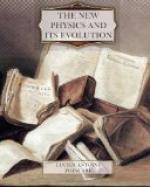Returning then to our starting-point, many contemporary physicists wish to subject Descartes’ idea to strict criticism. From the philosophical point of view, they first enquire whether it is really demonstrated that there exists nothing else in the knowable than matter and movement. They ask themselves whether it is not habit and tradition in particular which lead us to ascribe to mechanics the origin of phenomena. Perhaps also a question of sense here comes in. Our senses, which are, after all, the only windows open towards external reality, give us a view of one side of the world only; evidently we only know the universe by the relations which exist between it and our organisms, and these organisms are peculiarly sensitive to movement.
Nothing, however, proves that those acquisitions which are the most ancient in historical order ought, in the development of science, to remain the basis of our knowledge. Nor does any theory prove that our perceptions are an exact indication of reality. Many reasons, on the contrary, might be invoked which tend to compel us to see in nature phenomena which cannot be reduced to movement.
Mechanics as ordinarily understood is the study of reversible phenomena. If there be given to the parameter which represents time,[1] and which has assumed increasing values during the duration of the phenomena, decreasing values which make it go the opposite way, the whole system will again pass through exactly the same stages as before, and all the phenomena will unfold themselves in reversed order. In physics, the contrary rule appears very general, and reversibility generally does not exist. It is an ideal and limited case, which may be sometimes approached, but can never, strictly speaking, be met with in its entirety. No physical phenomenon ever recommences in an identical manner if its direction be altered. It is true that certain mathematicians warn us that a mechanics can be devised in which reversibility would no longer be the rule, but the bold attempts made in this direction are not wholly satisfactory.
[Footnote 1: I.e., the time-curve.—Ed.]
On the other hand, it is established that if a mechanical explanation of a phenomenon can be given, we can find an infinity of others which likewise account for all the peculiarities revealed by experiment. But, as a matter of fact, no one has ever succeeded in giving an indisputable mechanical representation of the whole physical world. Even were we disposed to admit the strangest solutions of the problem; to consent, for example, to be satisfied with the hidden systems devised by Helmholtz, whereby we ought to divide variable things into two classes, some accessible, and the others now and for ever unknown, we should never manage to construct an edifice to contain all the known facts. Even the very comprehensive mechanics of a Hertz fails where the classical mechanics has not succeeded.




